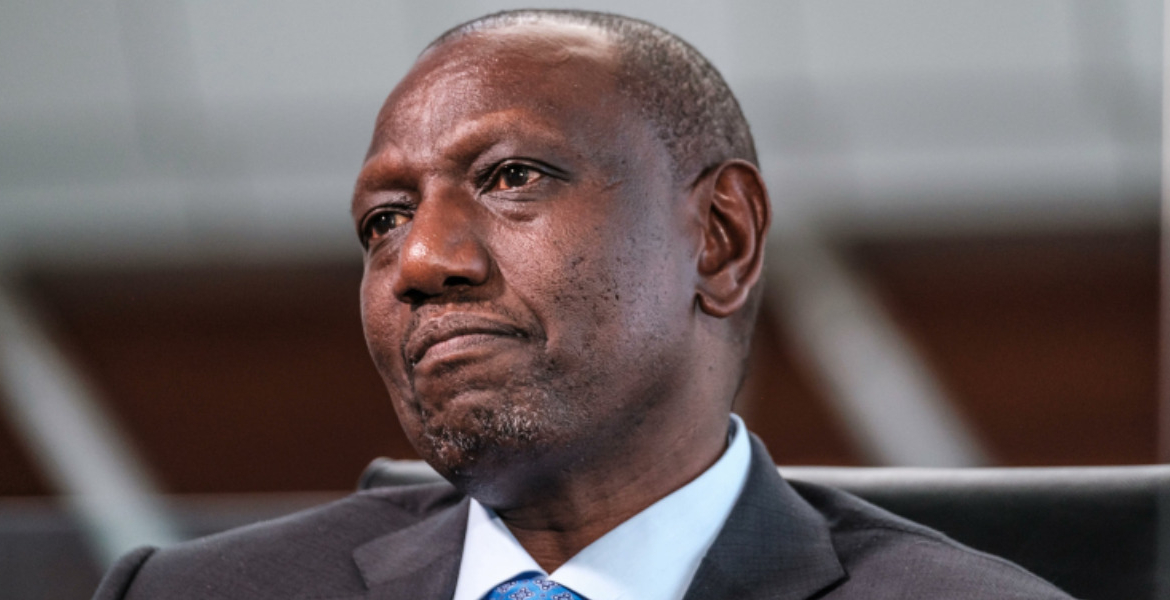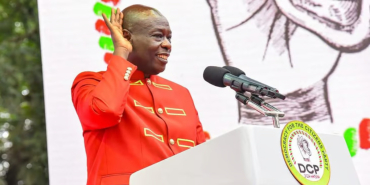Ruto Faces Unrelenting Political and Economic Challenges

President William Ruto seems to be a man entangled in a web of battles as he flirts with one headache after another, with the 58-year-old hardly catching a break since assuming power.
The Head of State has weathered a litany of storms since succeeding Uhuru Kenyatta in September 2022; be it from the courts, the Gen Z, civil society, political front and even within his Kenya Kwanza administration. But when he thinks he has successfully navigated one challenge, another crops up, testing even more the foundation of his shaky administration. The move by the President last Thursday to nominate a new chairperson and members of the Independent Electoral and Boundaries Commission (IEBC) to end the more than two-year wait for a new electoral body has attracted opposition rather than excitement.
In a surprise move, Dr Ruto opted against high-profile names – former Chief Registrar of the Judiciary Anne Amadi and ex-chairperson of the Commission for the Implementation of the Constitution Charles Nyachae, who had been touted as leading contenders for the critical position – to nominate former Turkana County Attorney Erastus Ethekon for appointment as chairperson of the IEBC, pending his approval by MPs.
Dr Ruto also named Registrar of Political Parties Ann Nderitu, Moses Mukhwana, Mary Karen Sorobit, Hassan Noor, Francis Aduol and Fahima Abdallah as commissioners. However, the Elections Observation Group is now demanding the immediate publication of the recruitment report, saying it was only submitted to the President but not made public. According to the lobby, failure to release the report will only deepen suspicions over and promote unnecessary speculations.
“We demand the immediate release of the full recruitment report. Transparency and accountability through observance of open data principles are fundamental for good governance, and withholding of this report undermines public trust, raising serious concerns about the integrity of the recruitment exercise…,” its Thursday statement reads.
The opposition, led by Wiper leader Kalonzo Musyoka and former CS Eugene Wamalwa, said the development lacked consultation. Questions have been raised about the impartiality of some of the nominees with reported links to Dr Ruto and opposition leader Raila Odinga. Governors have also rejected the Sh405 billion the National Treasury has allocated to counties in the next financial year.
They want the counties to be given Sh536 billion. Dr Ruto will infuriate governors more after his administration took away Sh11 billion road funds, as a stalemate with county chiefs over the Road Maintenance Levy Fund persists.
This dispute on allocation to counties that have senators and members of the National Assembly reading from different scripts could disrupt the budget process and derail the Division of Revenue Bill, 2025. The looming standoff could derail Budget approvals, triggering a prolonged tussle between the national and county governments. Such a clash has the potential to strain the already tense relationship between the two levels of government.
“The standoff is expected and will persist. At the time of Gen Z protests, the mediated figure was Sh400 billion. Now they want to give us Sh405 billion, yet we have piling non-discretionary expenses. This is a big joke. This will have an effect on the Budget-making process,” said Makueni Governor Mutula Kilonzo Jr.
Adding to the feud with governors, the Treasury is also struggling to timely disburse an equitable share allocation to the counties, despite a promise by Dr Ruto that his government would not starve counties of funds. The Treasury faces an uphill task of clearing a financial backlog of Sh162.7 billion owed to the counties by next month, made up of arrears for the last financial year amounting to Sh58 billion and outstanding balances for this fiscal year. Delays in disbursements to the counties hurt service delivery and payment to suppliers and contractors. The counties have had to endure delayed disbursements amid revenue shortfalls and mounting debt payments.
“They have partially disbursed to a few counties the allocation for March. So we have a backlog of two months. Remember we got budget cuts in the middle of the financial year because of Gen Z protests,” Mr Kilonzo Jnr said.
Dismal ordinary revenue collection and a Finance Bill with major concessions present a headache for Dr Ruto on how to balance between political survival and service delivery amid budgetary constraints. Last year, the withdrawal of the Finance Bill, 2024, set the country back some Sh346 billion back, forcing Kenya to opt for borrowing to bridge the budget deficit. Tax experts have warned that some proposals in the Finance Bill could have far-reaching implications for businesses and Kenyans.
“Moving essential goods like animal feed and pharmaceuticals from zero-rated to exempt status will increase costs for producers, and those costs will be passed on to consumers. It is worrying, especially for vulnerable groups,” said Jilna Shah, a tax director.
A report by the Kenya National Bureau of Statistics on Tuesday painted a grim picture of growing unemployment, with the economy creating fewer jobs, despite the promise to create jobs for a critical population, Dr Ruto rode on to rise to office in 2022. The economy added the fewest jobs since the 2020 coronavirus pandemic as growth slowed, dealing a blow to the Kenya Kwanza administration’s push to ease youth unemployment. Some 782,300 new jobs were created last year, down from 848,100 a year earlier, the data showed.
This emerged in a year when the economy also expanded at the slowest pace since the coronavirus pandemic, at 4.7 per cent compared to 5.7 per cent a year earlier, due to costly credit, floods that destroyed farms and disruptions following the deadly protests against the Finance Bill. Salaried workers continued to feel the pinch of a slowing economy as real wages, gross salaries after accounting for inflation, fell for a fifth straight year, hurting disposable incomes. Across 2024, Kenyan firms slowed down the hiring of workers and froze pay rises, citing reduced demand for goods and services amid biting cash flow problems.
In the run-up to the August 2022 election, Dr Ruto said his bottom-up economic model would spur economic growth among the poor, generally typified as boda boda, the unemployed youths and mama mboga (greengrocers). The Kenya Kwanza administration rode to power in 2022 on the strength of lofty promises of creating jobs for millions of jobless youths, prioritising the needs of low-income earners, among other groups. But for more than two years in office, some of the promises have not been realised, jolting him to start following up on some of the projects through his working tours to different regions.
The provision of universal healthcare under the Social Health Insurance Fund (SHIF) and university education under the new funding model are some of the critical government programmes, with a direct impact on millions of Kenyans, that face implementation challenges. On his ongoing working tours of different parts of the country, implementation of affordable housing, modern markets for mama mboga and last mile connectivity targeting poor households are increasingly becoming central, pointing to a president under enormous pressure to deliver with eyes on re-election in 2027.
Further, there is a growing disquiet with some members of the Cabinet, with Interior Cabinet Secretary Kipchumba Murkomen, his Treasury counterpart John Mbadi and Labour minister Alfred Mutua coming under sharp scrutiny over recent happenings in their dockets. Mr Murkomen has come under attack for growing insecurity cases and a poor human rights record. Mr Mbadi is in the eye of a storm over his utterances that paint him as a minister for his region, while CS Mutua has been dragged into a failed overseas job programme by the government.
A Missing Voices 2024 report launched last Tuesday revealed that 104 extrajudicial killings were recorded last year. On the other hand, enforced disappearances went up five times in 2024, hitting 55 compared to 2023, when 10 cases were recorded. Prior to 2024, the year 2019, with 38, had the highest number of enforced disappearances. Law Society of Kenya president Faith Odhiambo demanded that rogue police officers liable for the offences step down to allow for investigations.
“Enforced disappearances and extrajudicial killings are not bad apples, but symptoms of failure that require constitutional fumigation. The bad officers must be rooted out because they swore a pledge to uphold the rule of law,” she said.
Former Chief Justice David Maraga blasted the government for failing to ratify human rights conventions and related frameworks, enforced disappearances and extrajudicial killings. “The findings are deeply disconcerting. There’s a sharp increase of state-sponsored intimidation and suppression, and the report underscores an urgent need for systemic reforms in the state security agencies,” Mr Maraga said.
Adding to the growing headaches, the United Democratic Alliance (UDA) leader is currently battling against a shadow of the Kenyatta family that has been unrelenting in its push to have the youth agitate for proper governance. Former President Uhuru Kenyatta’s brother Muhoho Kenyatta last Monday joined his elder brother in calling on the youth to stand up and challenge the status quo by taking over leadership positions, saying they have played second fiddle for far too long.
The businessman also slammed the current system of governance, which he termed a stumbling block to the youth.
“It is their time now to grasp and take over the mantle of leadership, and as such the stewardship of our continent with their passion, innovation, and energy,” said Mr Muhoho in his address during the opening of the Duke of Edinburgh’s International Award Africa Regional Conference in Mombasa.
Weeks ago, Uhuru called on the youth to stand up and be counted in the fight for liberation. He urged the youth to embrace their role as freedom fighters of this era, remarks seen as a push for a youth-led revolution in Kenya and beyond. A surprise ceasefire between the President and his predecessor sealed in Ichaweri, Gatundu South, last December appears to have fallen apart, exposing a greater divide between their camps.
Adding to the storm, the two-faced approach by former premier Raila Odinga to the broad-based government, with the ODM leader speaking from both sides of his mouth, has put Dr Ruto in an awkward position. Mr Odinga has been scathing in his criticism of the government, where his lieutenants serve.








Comments
mother of all impunities…
Permalink
mother of all impunities deserve this
Add new comment